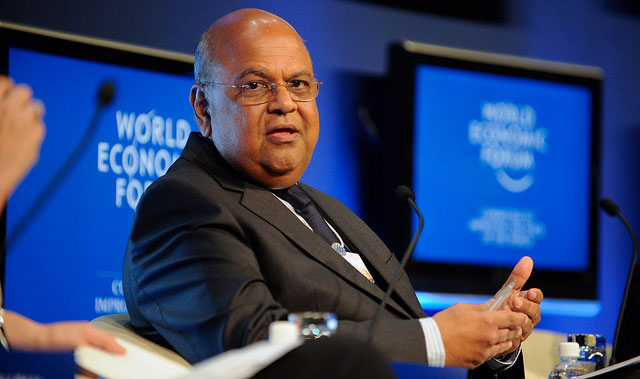
Finance minister Pravin Gordhan filed court papers that implicate President Jacob Zuma’s friends, the Gupta family, and companies they control in “suspicious transactions” totalling R6,8bn, signalling an escalation in the battle between the treasury and the presidency.
In an affidavit dated 13 October, Gordhan asked the high court to issue an order that he couldn’t intervene in a decision by the country’s largest banks to close accounts belonging to Gupta-controlled companies, as the Guptas repeatedly requested him to do, because he didn’t have the power and the lenders’ decisions appeared warranted.
The allegedly suspect transactions were detailed in a document that accompanied the affidavit and drafted by South Africa’s Financial Intelligence Centre, which seeks to combat money laundering.
Gordhan’s decision to turn to the high court marked a deepening in the rift between the national treasury and the presidency that began in December, when Zuma fired then-finance minister Nhlanhla Nene and replaced him with a little-known lawmaker. Zuma was forced to reconsider when the rand and bonds plunged, and he reinstated Gordhan to the position he held from 2009 until 2014.
Gordhan, 67, has been at loggerheads with Zuma, 74, over the management of state-owned companies and the national tax agency. Prosecutors on 11 October issued a summons for Gordhan to appear in court on 2 November to face charges of fraud for authorising a pension payout to a colleague in a case that he says is politically motivated and driven by people intent on looting state resources.
Gordhan’s court application may be targeted at ensuring his assertions are made public. While the nation’s graft ombudsman has been investigating allegations that the Guptas tried to exert undue influence over Zuma and the appointment of cabinet ministers — allegations they deny — the president is seeking a court interdict preventing the publication of her findings.
“The context in which this information has been made public does suggest that the gloves are off from Gordhan,” Daniel Silke, director of the Political Futures Consultancy in Cape Town, said by phone on Saturday. “He is making a concerted effort to take on those who threaten him. It feels as if something is moving toward an endgame.”
Gary Naidoo, a spokesman for the Gupta family, and Nazeem Howa, CEO of Oakbay Investments, which is owned by the Guptas, didn’t answer calls to their mobile phones. Yolisa Tyantsi, a spokeswoman for the treasury, confirmed that Gordhan filed the affidavit, which was published by the news website Daily Maverick.
Howa has denied the Gupta-controlled companies were involved in any illicit dealings and said the decisions to close their accounts were unjustified, unwarranted and threatened the jobs of their employees, according to letters he wrote to Gordhan that were also included in an annex to the affidavit. He also claimed the companies were the victims of a “politically motivated campaign” that was designed to marginalise their businesses.
“The continued public assertions that registered banks within the regulatory environment in South Africa acted for no adequate reason, irregularly and indeed for improper reasons in closing accounts are harmful to the reputation of South Africa’s financial and banking sectors,” Gordhan wrote. The affidavit was reported on earlier by the amaBhungane Centre for Investigative Journalism.
The document from Murray Mitchell, the director of the Financial Intelligence Centre, listed 72 suspicious transaction reports implicating members of the Gupta family and their companies, some of which comprised multiple entries for which no amount was listed. He didn’t specify why the transactions were considered suspect.
In April, the government told Gordhan and two other cabinet ministers to contact Absa, First National Bank, Standard Bank and Nedbank to discuss their decision to cease doing business with the Gupta-controlled companies. The banks refused to give details, saying dealings with clients are confidential.
Gordhan asked the banks to provide confidential reports they made to the Financial Intelligence Centre in an open court, spelling out the details of suspicious transactions, to determine whether there was any substance to Oakbay’s assertion that the banks acted improperly. — (c) 2016 Bloomberg LP




